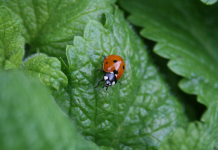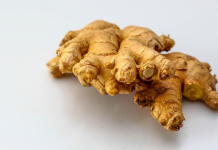
I’ve worked with lemon balm, magically and medicinally, in the past, but I’ve never worked with this lemon balm, on this patch of earth. Thirteen miles closer to the Columbia River Gorge, than the garden at my rental house, this place experiences more wind and slightly cooler temperatures than the other one. The energy here is different: it’s a little wilder, even though we’re situated near an interstate and several busy commercial streets. The Cascade Range looms on the eastern horizon, wreathed in clouds throughout the rainy season, dominated by the snowy slopes of Mount Hood, which I can see from the parking lot of the school across the street. I can feel the river and the mountains watching over my little house like quiet, slow-moving gods. I have a lot to learn about this specific patch of Melissa officinalis.
I moved into this house last September. When we arrived the soil under the trees in the back yard was bare and dry. It was obvious the previous owners had doused the land with enough weed killer to not only eradicate all the weeds, but to also kill most of the leaves on the rhododendron bushes. It was quite the contrast to my lush herb garden at the rental we were forced to leave, but my gardener’s eye wasn’t troubled by the barrenness. I saw good bones and lots of potential.
I spent the last several months watching with excited curiosity as weeds emerge from the bare earth: dandelion greens, purple dead nettle, greater celandine, wild bitter cress, and tiny wild violet leaves. In a shady corner sheltered by the house and fence, baby clumps of lemon balm huddle close to the soil, unmistakable with their lemony scent and taste.
It’s finally a mostly clear day, and the powerful winds have died down, so I bundle up in layers of wool, put on my ugliest, tallest rubber boots, and trudge out to have a little visit with the emerging clusters of lemon balm. Their leaves, still semi-furled in the cold air, are so heavily textured they make me think of dragon scales. They’ll be a vibrant, almost yellow green in summer, but right now they’re deep green with a flush of purplish brown closer to the stem. I sit down in the middle of the baby balm for a quiet chat.
I lean back against the wood fence, let my fingers trail over the rough young leaves, and gaze up at the sky. It’s that pure, pale blue with fluffy ephemeral clouds drifting slowly along, so perfect it seems almost artificial, and I breathe in the cold air with pleasure. I reach out my mind toward the lemon balm, say hello, and feel my deep affection for this cheerful plant flow out from my heart center. The lemon balm responds by opening up her consciousness to me eagerly. Not all plants are this enthusiastic about working with humans, but I’ve never met a lemon balm plant that didn’t energetically tackle-hug me like an excited puppy. This little community of Melissa, however, shows me a few things I didn’t expect.
Related: Herbalism for beginners: Where to start, by Emma Kathryn
Related: Springtime kitchen witchery: 10 herbs for protection, peace, and luck, by Donyae Coles

This family of plants shows me the web of connection around us. I feel her roots trailing through the earth and mingling with the roots of the nearby dandelions, violets, and wild cress. I feel the soil beneath us connecting us to the house, to the nearby arbor and its sleeping grape vine, to the robin perched on the arbor and the countless tiny song birds wheeling around us. I feel the holly tree in the neighbour’s yard, the drowsy raspberry bushes on the other side of the chain link fence, the gently swaying trees in the yard whose names I have yet to learn. I even feel the massive peaks of the mountain range and the river, though I can’t see them from where I sit.
Lemon balm revels in the bustling, growing, evolving life around her. She radiates love to all beings around her, even to the people who sprayed poison on her leaves last summer. When my own heart constricts thinking of what they did, she seems to shrug and soften and say maybe some day they will learn better. Maybe some day we’ll all learn better.
Of course, she shares with me her happiness too, her way of being simultaneously serene and joyful. But today, for the first time I can see how that calm happiness grows from connection, and I can see that lemon balm can help us connect to others without being knocked off our feet by them. She is enthusiastic about company, but she is able to be her strong self no matter who is present, no matter how they behave toward her. As an introvert and an empath, I’m often flattened by the company of others, even those I like. I wonder if allying with the lemon balm in my yard might help me keep my center and my strength when I’m among others. I’m certain she can help me connect – to people and to this place where I still feel like a stranger.
It’s too soon to take very much from the plant, though she’s more than willing to give. I settle for a few sprigs to flavour my daily herbal infusion, and as I enjoy the lemony taste I feel like lemon balm connects me to the red clover brew in my cup, like my body can receive even more from this nourishing plant with Melissa’s help.
If you’re looking for a plant spirit ally, you could certainly do worse than generous, joyful lemon balm. In summer, she is so plentiful you can harvest baskets full of her fragrant leaves and flowers and still leave plenty for the bees and butterflies. She’s very good at lifting the spirit, especially when steeped in a glass of wine or allowed to flavor a pitcher of ice water on a hot summer day. A strong infusion added to the bath can help chase away melancholy and weariness, especially after illness or upsetting news. You might want to be aware, however, that unlike many fragrant herbs, Melissa loses the majority of her fragrance when dried. Since her scent and flavour are a significant part of her healing powers, I recommend using fresh lemon balm for mood-lifting magick or medicine.
Of course, lemon balm’s cheerful abundance also makes her a good ally in magical workings around success and money, especially if you lack confidence, feel cut off from the source of plenty, or find your work oppressive and overwhelming. For this purpose you can use the plant in almost any way you can imagine. The dried leaves crumble easily, making them a good addition to magical powders, incenses, bundles or poppets. Pretty much any magical method will work: Lemon balm isn’t fussy about how you play together, as long as you are nice.
A member of the mint family, lemon balm is easy to grow, and she’s one of the few herbs that thrives in shade. I’ve even grown her right underneath a huge old walnut, where she blithely ignored the growth-suppressing chemicals that prevent many other plants from surviving its proximity. She can spread vigorously, so if you decide to invite her into her garden you’ll want choose her location carefully. But once you make friends with Melissa, she’ll happily make all kinds of magick with you, and help you connect more easily with other magical allies as well.
Related: Success drawing wash: How to make, consecrate, and use it, by Emma Kathryn
Related: The Witching Herbs, reviewed by Laura Gyre
Image credits: Ingrid S








